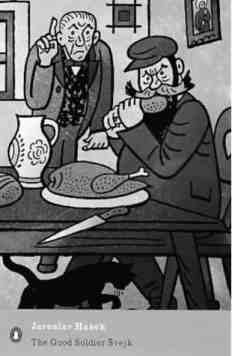Whistling Shade
Winter 2010

Poetry
Marshland Dusk - John Philip Johnson
The Wedding Room - Shanan Ballam
Fiction
Angle Side Angle - Mary Lynn Reed
There Is Always More Work to be Done - Dave Barrett
The Relief Printer - Jessica Rae Hahn
Reviews
The Nine Scoundrels by Deanna Reiter
Whistling Shade's Literary Cafe Review
Memoir
My Meeting with Mengele - Maryla Neuman
Essay
Eating Your Words in a Prague Cafe - John-Ivan Palmer
John Dos Passos, a View from Left Field - Hugh Mahoney
Lost Writers of Minnesota: Clifford D. Simak - Joel Van Valin
Columns
Shading Dealings - Race-based Literary Journals

Eating Your Words in a Prague Cafe
John-Ivan Palmer
If the tavern is a place for dangerous bodies, the cafe is a place for dangerous minds.
Jaroslav Hasek was one such mind, known to haunt the coffee houses of early 20th century Prague. He was the author of the unfinished comic opus, The Good Soldier Svejk, published posthumously in 1930, and translated into 60 languages. Although he wrote voluminously, he always lived on the edge of poverty. When the author wasn't eking out a living as a dog salesman, or sitting in jail for frequent acts of political vandalism, he liked to hang out and sip cappuccinos. In the city's cafes he wrote many of his hundreds of short stories, and cooked up pranks with anarchist friends. Perhaps it was in one of these cafes that he came up with the ultimate fiction-the attempt to fake his own death.
Prague's cafe culture was the center for Czech radical art movements, with their many eagerly awaited and acted upon manifestos. It was a Sargasso Sea of publications with titles like ReD, Zodiac, Disk, and Free Directions. In this setting, Jaroslav Hasek, bisexual bigamist and dangerous joker, was known for his ability to conceive, compose and complete a short story in a matter of minutes.
An anecdote has come down through the years, which reflects not only this fiction writer's confidence in his own abilities, but the vibrant nature of the written word itself, as it thrived in the cafe life of Hasek's Prague.
One day, the story goes, Hasek sat down in a cafe and began ordering food and beverages. It was no problem for the corpulent writer that he didn't have any money. He simply ordered more food and beverages and happily feasted away. At some point during his extravagant meal, he had the waiter bring him a volume from an encyclopedia. Hasek opened it to a random page, then wrote a short story on the spot based on what he saw. Unfortunately, we don't know which of his many stories it was. When he was through writing, he sent the manuscript with the waiter to a newspaper up the street. While Hasek enjoyed a few more delicious cappuccinos, the waiter secured an advance from the editor and returned with the money, which Hasek used to pay his bill.
His friends, among whom the story circulated, were notorious crackpots and liars. Obviously he couldn't pull a stunt like this every time he was hungry, and even the legendary Jaroslav Hasek had to have his work rejected occasionally. So it was a reckless gamble by a reckless mind at a wild point in history after the Great War. Such an event today is inconceivable, but in Prague's cafe culture, when life, words and audience were still a unity, such a story was at least probable, if not entirely true.
John-Ivan Palmer’s work has appeared in Pushcart Prizes, Exquisite Corpse, Nth Position, Book Happy, Other Voices, Wisconsin Review, New Oregon Review, San Francisco Examiner, Milwaukee Journal, Minneapolis Star-Tribune and others. His novel Motels of Burning Madness has just been published by The Drill Press.